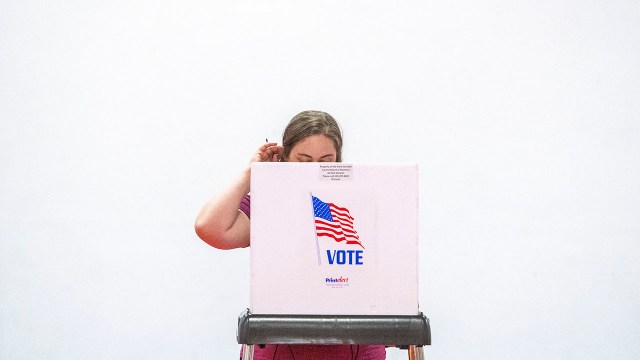
Americans are generally confident that this fall’s presidential election will be conducted fairly and accurately.
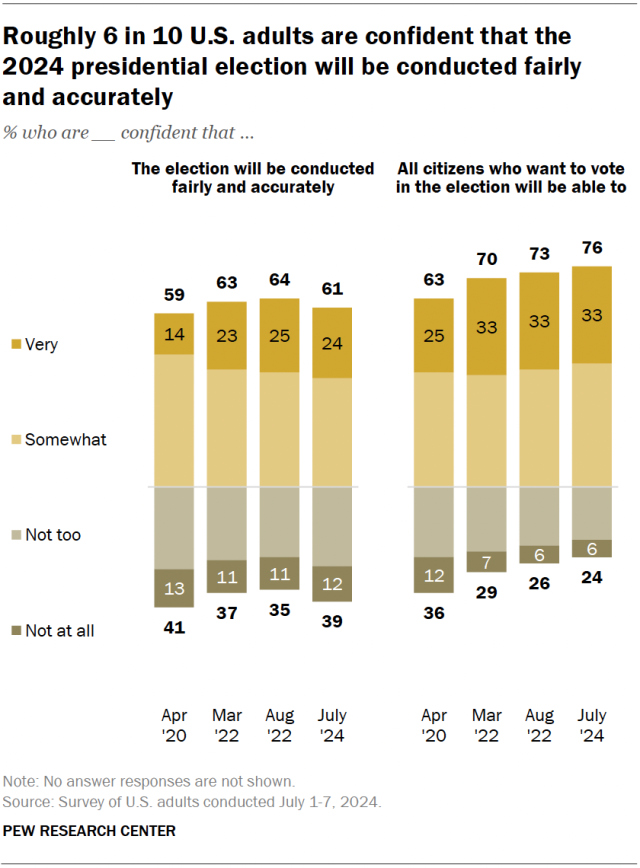
Yet Republicans and those who lean toward the GOP are far less confident of this than Democrats and Democratic leaners, according to a Pew Research Center survey conducted July 1-7, 2024.
Overall, 61% of Americans say they are very or somewhat confident the election will be conducted fairly and accurately. These views have changed little since 2022 and 2020.
The public is more confident that all citizens who want to vote this fall will be able to. About three-quarters of Americans (76%) say they are confident about this, a modest increase since 2020.
Pew Research Center conducted this study to understand Americans’ views of the 2024 presidential election. For this analysis, we surveyed 9,424 adults from July 1 to 7, 2024.
Everyone who took part in this survey is a member of the Center’s American Trends Panel (ATP), a group of people recruited through national, random sampling of residential addresses who have agreed to take surveys regularly. This kind of recruitment gives nearly all U.S. adults a chance of selection. Surveys were conducted either online or by telephone with a live interviewer. The survey is weighted to be representative of the U.S. adult population by gender, race, ethnicity, partisan affiliation, education and other factors. Read more about the ATP’s methodology.
Here are the questions used for this analysis, the topline and the survey methodology.
Partisan differences in views of the way elections are conducted
Between 2020 and 2022, Democrats’ and Republicans’ views about the accuracy of elections shifted. Today, partisan expectations about the 2024 presidential election are roughly on par with views during the 2022 midterms.
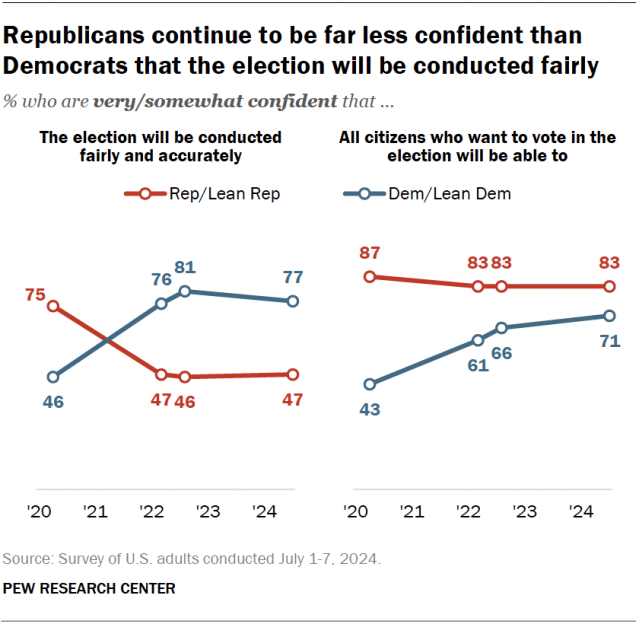
Currently, Democrats are 30 percentage points more likely than Republicans to express confidence that the presidential election will be conducted fairly (77% vs. 47%). However, in April 2020, as the coronavirus outbreak was spreading in the U.S., Republicans were more confident than Democrats that the election would be conducted fairly and accurately (75% vs. 46%).
At that time, Democrats were far more likely than Republicans to believe that the COVID-19 pandemic would disrupt voting. Eight-in-ten Democrats said this was likely, compared with about half of Republicans.
Over the same period, the partisan gap in views of whether all citizens who want to vote in the election will be able to has narrowed. This is almost entirely due to a change in views among Democrats.
In April 2020, 43% of Democrats had confidence this would be the case. Today, 71% say this. Among Republicans, roughly eight-in-ten or more have continued to say they are confident that all citizens who want to vote will be able to.
Intraparty divides in views of election fairness
Among Democrats
A majority of Democrats – regardless of their age, race or ethnicity – say they have at least some confidence that the election will be conducted fairly and accurately. However, younger Democrats are somewhat less likely than their older counterparts to say this.
Two-thirds of Democrats ages 18 to 29 are at least somewhat confident, compared with 87% of those 65 and older.
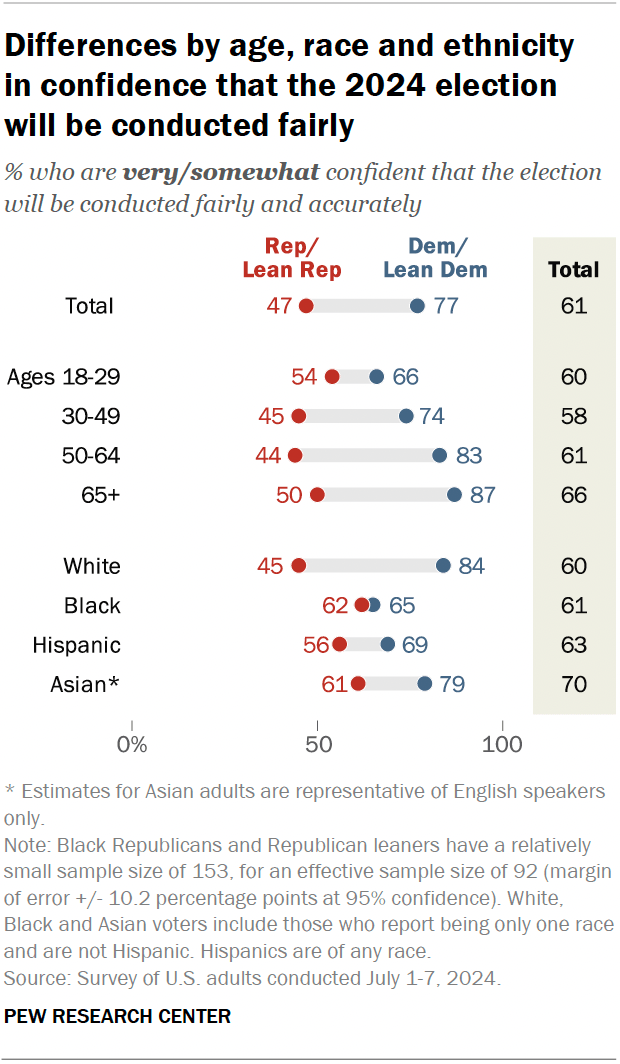
In addition, White Democrats are far more likely than Black and Hispanic Democrats to say they are confident the 2024 election will be conducted fairly and accurately.
Among Republicans
Among Republicans, age gaps in views of the election are modest. There are more pronounced differences by race and ethnicity.
White Republicans (45%) are less likely than Black (62%), Asian (61%) and Hispanic (56%) Republicans to say they are confident the election will be conducted fairly and accurately.
Intraparty divides in views of voting accessibility
Among Democrats
As with expectations that the election will be conducted fairly and accurately, there are differences by age, race and ethnicity in Democrats’ views of whether all citizens who want to vote in the election will be able to.
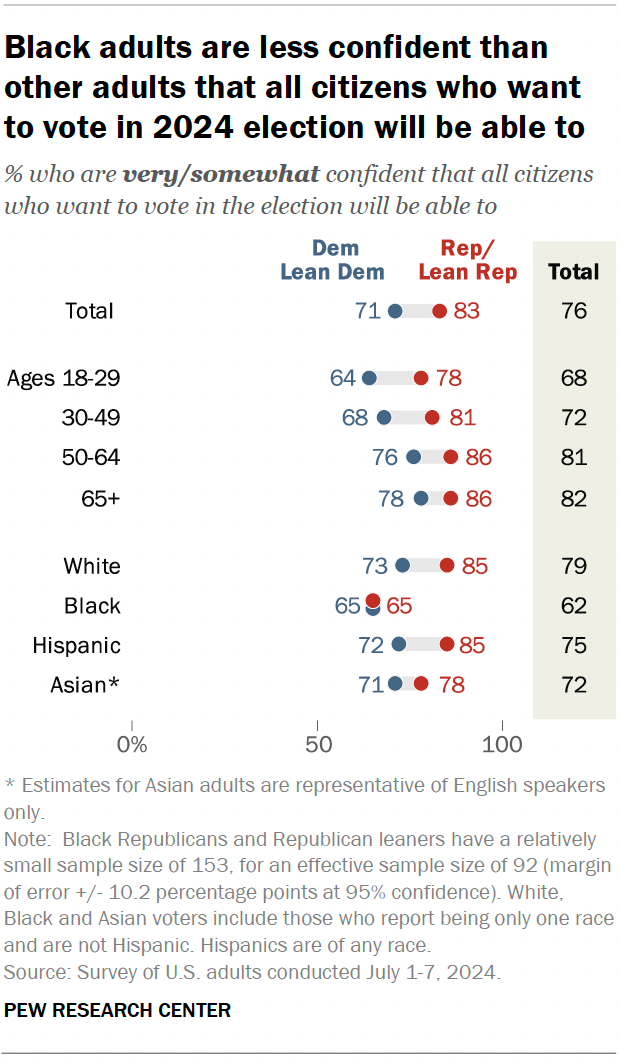
Democrats ages 50 and older are more likely than those under 50 to say they are confident in this (77% vs. 66%).
Black Democrats are less likely than White and Hispanic Democrats to say they are confident that all citizens who want to vote in the election will be able to.
Among Republicans
Republicans ages 50 and older are slightly more likely than those under 50 to say they are confident that all citizens who want to vote in the election will be able to.
But there are much wider divisions by race and ethnicity. Black Republicans (65%) are far less likely than White (85%), Hispanic (85%) and Asian Republicans (78%) to say they are confident that all citizens who want to vote will be able to.
Note: Here are the questions used for this analysis, the topline and the survey methodology.
